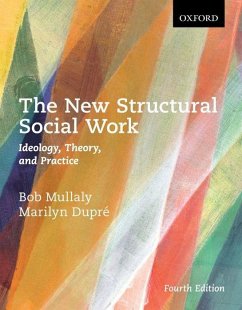- Broschiertes Buch
- Merkliste
- Auf die Merkliste
- Bewerten Bewerten
- Teilen
- Produkt teilen
- Produkterinnerung
- Produkterinnerung
The New Structural Social Work is an up-to-date and thorough investigation of progressive social work theory that demonstrates the shortcomings of welfare capitalism and how students can incorporate a radical alternative to conventional social work into their practice.
Andere Kunden interessierten sich auch für
![Introducing Child Care Social Work: Contemporary Policy and Practice Introducing Child Care Social Work: Contemporary Policy and Practice]() Jill DaveyIntroducing Child Care Social Work: Contemporary Policy and Practice63,99 €
Jill DaveyIntroducing Child Care Social Work: Contemporary Policy and Practice63,99 €![Latinx in Social Work: Stories that heal, inspire, and connect communities Latinx in Social Work: Stories that heal, inspire, and connect communities]() Erica Priscilla Sandoval Lcsw-SifiLatinx in Social Work: Stories that heal, inspire, and connect communities23,99 €
Erica Priscilla Sandoval Lcsw-SifiLatinx in Social Work: Stories that heal, inspire, and connect communities23,99 €![Social Work: A Life of Meaning and Depth Social Work: A Life of Meaning and Depth]() Linda ConverseSocial Work: A Life of Meaning and Depth11,99 €
Linda ConverseSocial Work: A Life of Meaning and Depth11,99 €![Radicals in Australian Social Work: Stories of Lifelong Activism Radicals in Australian Social Work: Stories of Lifelong Activism]() Radicals in Australian Social Work: Stories of Lifelong Activism42,99 €
Radicals in Australian Social Work: Stories of Lifelong Activism42,99 €![Brummie Girls Do Social Work: 1. A Collection of Stories Brummie Girls Do Social Work: 1. A Collection of Stories]() Nicola BrownBrummie Girls Do Social Work: 1. A Collection of Stories14,99 €
Nicola BrownBrummie Girls Do Social Work: 1. A Collection of Stories14,99 €![Tinplate Work: With Numerous Engravings and Diagrams Tinplate Work: With Numerous Engravings and Diagrams]() Tinplate Work: With Numerous Engravings and Diagrams22,99 €
Tinplate Work: With Numerous Engravings and Diagrams22,99 €![Intimate Partner Violence: A Bibliography of Theory, Research, and Intervention Intimate Partner Violence: A Bibliography of Theory, Research, and Intervention]() E. J. ChoIntimate Partner Violence: A Bibliography of Theory, Research, and Intervention13,99 €
E. J. ChoIntimate Partner Violence: A Bibliography of Theory, Research, and Intervention13,99 €-
-
-
The New Structural Social Work is an up-to-date and thorough investigation of progressive social work theory that demonstrates the shortcomings of welfare capitalism and how students can incorporate a radical alternative to conventional social work into their practice.
Hinweis: Dieser Artikel kann nur an eine deutsche Lieferadresse ausgeliefert werden.
Hinweis: Dieser Artikel kann nur an eine deutsche Lieferadresse ausgeliefert werden.
Produktdetails
- Produktdetails
- Verlag: Hurst & Co.
- 4th edition
- Seitenzahl: 432
- Erscheinungstermin: 10. Dezember 2018
- Englisch
- Abmessung: 226mm x 174mm x 22mm
- Gewicht: 609g
- ISBN-13: 9780199022946
- ISBN-10: 0199022941
- Artikelnr.: 53612202
- Herstellerkennzeichnung
- Libri GmbH
- Europaallee 1
- 36244 Bad Hersfeld
- gpsr@libri.de
- Verlag: Hurst & Co.
- 4th edition
- Seitenzahl: 432
- Erscheinungstermin: 10. Dezember 2018
- Englisch
- Abmessung: 226mm x 174mm x 22mm
- Gewicht: 609g
- ISBN-13: 9780199022946
- ISBN-10: 0199022941
- Artikelnr.: 53612202
- Herstellerkennzeichnung
- Libri GmbH
- Europaallee 1
- 36244 Bad Hersfeld
- gpsr@libri.de
Bob Mullaly is senior scholar and former dean in the Faculty of Social Work at University of Manitoba. Previously, he taught in the Department of Social Work at Victoria University in Melbourne, Australia, and in the social work program that he founded at St. Thomas University in Fredericton, New Brunswick. He has co-authored the recent third edition of Challenging Oppression and Confronting Privilege with Juliana West (OUP Canada, 2018). Marilyn Dupré(c) is assistant professor and director of the School of Social Work at St. Thomas University. She has previously taught in social work departments at Carleton University and University of Manitoba. Marilyn has published articles in Social Work Education, and her research interests include structural social work theory and practice, critical anti-oppressive theory and practice, and critical disability studies and social work education. In addition to her scholarship, she has a long history of in-service social work practice, including four years as the child welfare program manager for the Government of New Brunswick.
* Boxes
* Acknowledgements
* Preface
* Part1: In Search of a Paradigm
* 1. The Social Work Vision: A Progressive View
* Introduction
* Conventional and Progressive Perspectives within Social Work
* Need for a Progressive Social Work Vision
* The Fundamental Values of Social Work
* The Secondary (Instrumental) Values of Social Work
* A Progressive Perspective of Social Work Ideology
* Social Work and Social Problems
* The Ideal Social Welfare System: A Progressive View
* Conclusion
* Critical Questions
* 2. Capitalism, Crises, and Paradigms
* Introduction
* The Changing Face of Capitalism
* The Globalization Thesis
* The Crisis of the Welfare State in an Age of Globalization
* Social Work in Crisis
* Hopeful Signs
* The Concepts of Ideology and Paradigm
* Utility of the Paradigm Concept for Social Work
* Conclusion
* Critical Questions
* 3. The Neo-conservative Paradigm
* Introduction
* Conservatism
* Neo-conservatism
* Views of the Nature of Humans, Society, the State, Social Justice,
and Social Change
* Social Beliefs
* Economic Beliefs
* Political Beliefs
* View of Social Problems
* View of Social Welfare
* Social Work Practice within the Neo-conservative Paradigm
* Critique of the Neo-conservative Paradigm
* Conclusion
* Critical Questions
* 4. The Liberal and Neo-liberal Paradigms
* Introduction
* Liberalism(s)
* Views of the Nature of Humans, Society, the State, Social Justice,
and Social Change
* Social Beliefs
* Economic Beliefs
* Political Beliefs
* View of Social Problems
* View of Social Welfare
* Social Work Practice within the Liberal Paradigm
* Canada as a Liberal State
* Critique of the Liberal Paradigm
* Liberal Hegemony in Social Work
* Conclusion
* Critical Questions
* 5. The Social Democratic Paradigm
* Introduction
* Socialism
* Social Democracy
* Views of the Nature of Humans, Society, the State, Social Justice,
and Social Change
* Social Beliefs
* Economic Beliefs
* Political Beliefs
* View of Social Problems
* View of Social Welfare
* Social Work Practice within the Social Democratic Paradigm
* Critique of the Social Democratic Paradigm
* Current Status of Social Democracy in Three Anglo-democracies
* Conclusion
* Critical Questions
* 6. The Marxist Paradigm
* Introduction
* Marxism
* Views of the Nature of Humans, Society, the State, Social Justice,
and Social Change
* Social Beliefs
* Economic Beliefs
* Political Beliefs
* View of Social Problems
* View of Social Welfare
* Social Work Practice within the Marxist Paradigm
* Critique of the Marxist Paradigm
* Contributions of Marxism to Social Work in Anglo-democracies
* Conclusion
* Critical Questions
* 7. Feminist, Anti-racist, and Postmodern Critiques
* Introduction
* Feminist Critique
* Anti-racist Critique
* Postmodern Critique
* Conclusion
* Critical Questions
* Part 2: Structural Social Work Theory and Oppression
* 8. A Reconstructed Theory of Structural Social Work
* Introduction
* Socialist Ideology
* The Heritage of Structural Social Work Theory
* The Imperative of Theory for Social Work
* Order and Conflict/Change Perspectives
* Structural Social Work as a Critical Social Theory
* The Dialectic in Structural Social Work
* Structural Social Work: A Conceptual Framework
* Conclusion
* Critical Questions
* 9. Oppression: The Focus of Structural Social Work
* Introduction
* The Nature of Oppression
* Oppression as a Social Justice Issue
* The Origins of Modern-Day Oppression and the Politics of Identity
* The Dynamics of Oppression
* Levels of Oppression
* The Multiplicity and Persistence of Oppression
* Forms of Oppression
* Oppression as Structural Violence
* Responses of Oppressed People to Their Oppression
* Structural Social Work with Oppressed Groups
* Conclusion
* Critical Questions
* 10. Overview of Privilege
* Introduction
* The Nature of Privilege
* Dynamics of Privilege
* Personal, Cultural, and Structural Levels of Privilege
* Why Dominant Groups Do Not See Privilege as a Problem
* A Taxonomy of Everyday Examples of Unearned Privilege
* Social Work and Privilege
* What Can We Do?
* Pedagogy of Privilege
* Conclusion
* Critical Questions
* Part 3: Structural Social Work: Practice Elements
* 11. Working within (and against) the System: Radical Humanism
* Introduction
* Working with Service Users
* Consciousness-Raising
* In the Belly of the Beast: Surviving and Changing the Workplace
* Conclusion
* Critical Questions
* 12. Working outside (and against) the System: Radical Structuralism
and Working within Ourselves
* Introduction
* Working outside and against the System
* Challenging and Resisting the Dominant Order
* The Moral Premise of Social Welfare: Universal Human Needs
* Working within Ourselves
* Making the Political Personal in Our Own Lives
* Critical Questions
* Notes
* Bibliography
* Index
* Acknowledgements
* Preface
* Part1: In Search of a Paradigm
* 1. The Social Work Vision: A Progressive View
* Introduction
* Conventional and Progressive Perspectives within Social Work
* Need for a Progressive Social Work Vision
* The Fundamental Values of Social Work
* The Secondary (Instrumental) Values of Social Work
* A Progressive Perspective of Social Work Ideology
* Social Work and Social Problems
* The Ideal Social Welfare System: A Progressive View
* Conclusion
* Critical Questions
* 2. Capitalism, Crises, and Paradigms
* Introduction
* The Changing Face of Capitalism
* The Globalization Thesis
* The Crisis of the Welfare State in an Age of Globalization
* Social Work in Crisis
* Hopeful Signs
* The Concepts of Ideology and Paradigm
* Utility of the Paradigm Concept for Social Work
* Conclusion
* Critical Questions
* 3. The Neo-conservative Paradigm
* Introduction
* Conservatism
* Neo-conservatism
* Views of the Nature of Humans, Society, the State, Social Justice,
and Social Change
* Social Beliefs
* Economic Beliefs
* Political Beliefs
* View of Social Problems
* View of Social Welfare
* Social Work Practice within the Neo-conservative Paradigm
* Critique of the Neo-conservative Paradigm
* Conclusion
* Critical Questions
* 4. The Liberal and Neo-liberal Paradigms
* Introduction
* Liberalism(s)
* Views of the Nature of Humans, Society, the State, Social Justice,
and Social Change
* Social Beliefs
* Economic Beliefs
* Political Beliefs
* View of Social Problems
* View of Social Welfare
* Social Work Practice within the Liberal Paradigm
* Canada as a Liberal State
* Critique of the Liberal Paradigm
* Liberal Hegemony in Social Work
* Conclusion
* Critical Questions
* 5. The Social Democratic Paradigm
* Introduction
* Socialism
* Social Democracy
* Views of the Nature of Humans, Society, the State, Social Justice,
and Social Change
* Social Beliefs
* Economic Beliefs
* Political Beliefs
* View of Social Problems
* View of Social Welfare
* Social Work Practice within the Social Democratic Paradigm
* Critique of the Social Democratic Paradigm
* Current Status of Social Democracy in Three Anglo-democracies
* Conclusion
* Critical Questions
* 6. The Marxist Paradigm
* Introduction
* Marxism
* Views of the Nature of Humans, Society, the State, Social Justice,
and Social Change
* Social Beliefs
* Economic Beliefs
* Political Beliefs
* View of Social Problems
* View of Social Welfare
* Social Work Practice within the Marxist Paradigm
* Critique of the Marxist Paradigm
* Contributions of Marxism to Social Work in Anglo-democracies
* Conclusion
* Critical Questions
* 7. Feminist, Anti-racist, and Postmodern Critiques
* Introduction
* Feminist Critique
* Anti-racist Critique
* Postmodern Critique
* Conclusion
* Critical Questions
* Part 2: Structural Social Work Theory and Oppression
* 8. A Reconstructed Theory of Structural Social Work
* Introduction
* Socialist Ideology
* The Heritage of Structural Social Work Theory
* The Imperative of Theory for Social Work
* Order and Conflict/Change Perspectives
* Structural Social Work as a Critical Social Theory
* The Dialectic in Structural Social Work
* Structural Social Work: A Conceptual Framework
* Conclusion
* Critical Questions
* 9. Oppression: The Focus of Structural Social Work
* Introduction
* The Nature of Oppression
* Oppression as a Social Justice Issue
* The Origins of Modern-Day Oppression and the Politics of Identity
* The Dynamics of Oppression
* Levels of Oppression
* The Multiplicity and Persistence of Oppression
* Forms of Oppression
* Oppression as Structural Violence
* Responses of Oppressed People to Their Oppression
* Structural Social Work with Oppressed Groups
* Conclusion
* Critical Questions
* 10. Overview of Privilege
* Introduction
* The Nature of Privilege
* Dynamics of Privilege
* Personal, Cultural, and Structural Levels of Privilege
* Why Dominant Groups Do Not See Privilege as a Problem
* A Taxonomy of Everyday Examples of Unearned Privilege
* Social Work and Privilege
* What Can We Do?
* Pedagogy of Privilege
* Conclusion
* Critical Questions
* Part 3: Structural Social Work: Practice Elements
* 11. Working within (and against) the System: Radical Humanism
* Introduction
* Working with Service Users
* Consciousness-Raising
* In the Belly of the Beast: Surviving and Changing the Workplace
* Conclusion
* Critical Questions
* 12. Working outside (and against) the System: Radical Structuralism
and Working within Ourselves
* Introduction
* Working outside and against the System
* Challenging and Resisting the Dominant Order
* The Moral Premise of Social Welfare: Universal Human Needs
* Working within Ourselves
* Making the Political Personal in Our Own Lives
* Critical Questions
* Notes
* Bibliography
* Index
* Boxes
* Acknowledgements
* Preface
* Part1: In Search of a Paradigm
* 1. The Social Work Vision: A Progressive View
* Introduction
* Conventional and Progressive Perspectives within Social Work
* Need for a Progressive Social Work Vision
* The Fundamental Values of Social Work
* The Secondary (Instrumental) Values of Social Work
* A Progressive Perspective of Social Work Ideology
* Social Work and Social Problems
* The Ideal Social Welfare System: A Progressive View
* Conclusion
* Critical Questions
* 2. Capitalism, Crises, and Paradigms
* Introduction
* The Changing Face of Capitalism
* The Globalization Thesis
* The Crisis of the Welfare State in an Age of Globalization
* Social Work in Crisis
* Hopeful Signs
* The Concepts of Ideology and Paradigm
* Utility of the Paradigm Concept for Social Work
* Conclusion
* Critical Questions
* 3. The Neo-conservative Paradigm
* Introduction
* Conservatism
* Neo-conservatism
* Views of the Nature of Humans, Society, the State, Social Justice,
and Social Change
* Social Beliefs
* Economic Beliefs
* Political Beliefs
* View of Social Problems
* View of Social Welfare
* Social Work Practice within the Neo-conservative Paradigm
* Critique of the Neo-conservative Paradigm
* Conclusion
* Critical Questions
* 4. The Liberal and Neo-liberal Paradigms
* Introduction
* Liberalism(s)
* Views of the Nature of Humans, Society, the State, Social Justice,
and Social Change
* Social Beliefs
* Economic Beliefs
* Political Beliefs
* View of Social Problems
* View of Social Welfare
* Social Work Practice within the Liberal Paradigm
* Canada as a Liberal State
* Critique of the Liberal Paradigm
* Liberal Hegemony in Social Work
* Conclusion
* Critical Questions
* 5. The Social Democratic Paradigm
* Introduction
* Socialism
* Social Democracy
* Views of the Nature of Humans, Society, the State, Social Justice,
and Social Change
* Social Beliefs
* Economic Beliefs
* Political Beliefs
* View of Social Problems
* View of Social Welfare
* Social Work Practice within the Social Democratic Paradigm
* Critique of the Social Democratic Paradigm
* Current Status of Social Democracy in Three Anglo-democracies
* Conclusion
* Critical Questions
* 6. The Marxist Paradigm
* Introduction
* Marxism
* Views of the Nature of Humans, Society, the State, Social Justice,
and Social Change
* Social Beliefs
* Economic Beliefs
* Political Beliefs
* View of Social Problems
* View of Social Welfare
* Social Work Practice within the Marxist Paradigm
* Critique of the Marxist Paradigm
* Contributions of Marxism to Social Work in Anglo-democracies
* Conclusion
* Critical Questions
* 7. Feminist, Anti-racist, and Postmodern Critiques
* Introduction
* Feminist Critique
* Anti-racist Critique
* Postmodern Critique
* Conclusion
* Critical Questions
* Part 2: Structural Social Work Theory and Oppression
* 8. A Reconstructed Theory of Structural Social Work
* Introduction
* Socialist Ideology
* The Heritage of Structural Social Work Theory
* The Imperative of Theory for Social Work
* Order and Conflict/Change Perspectives
* Structural Social Work as a Critical Social Theory
* The Dialectic in Structural Social Work
* Structural Social Work: A Conceptual Framework
* Conclusion
* Critical Questions
* 9. Oppression: The Focus of Structural Social Work
* Introduction
* The Nature of Oppression
* Oppression as a Social Justice Issue
* The Origins of Modern-Day Oppression and the Politics of Identity
* The Dynamics of Oppression
* Levels of Oppression
* The Multiplicity and Persistence of Oppression
* Forms of Oppression
* Oppression as Structural Violence
* Responses of Oppressed People to Their Oppression
* Structural Social Work with Oppressed Groups
* Conclusion
* Critical Questions
* 10. Overview of Privilege
* Introduction
* The Nature of Privilege
* Dynamics of Privilege
* Personal, Cultural, and Structural Levels of Privilege
* Why Dominant Groups Do Not See Privilege as a Problem
* A Taxonomy of Everyday Examples of Unearned Privilege
* Social Work and Privilege
* What Can We Do?
* Pedagogy of Privilege
* Conclusion
* Critical Questions
* Part 3: Structural Social Work: Practice Elements
* 11. Working within (and against) the System: Radical Humanism
* Introduction
* Working with Service Users
* Consciousness-Raising
* In the Belly of the Beast: Surviving and Changing the Workplace
* Conclusion
* Critical Questions
* 12. Working outside (and against) the System: Radical Structuralism
and Working within Ourselves
* Introduction
* Working outside and against the System
* Challenging and Resisting the Dominant Order
* The Moral Premise of Social Welfare: Universal Human Needs
* Working within Ourselves
* Making the Political Personal in Our Own Lives
* Critical Questions
* Notes
* Bibliography
* Index
* Acknowledgements
* Preface
* Part1: In Search of a Paradigm
* 1. The Social Work Vision: A Progressive View
* Introduction
* Conventional and Progressive Perspectives within Social Work
* Need for a Progressive Social Work Vision
* The Fundamental Values of Social Work
* The Secondary (Instrumental) Values of Social Work
* A Progressive Perspective of Social Work Ideology
* Social Work and Social Problems
* The Ideal Social Welfare System: A Progressive View
* Conclusion
* Critical Questions
* 2. Capitalism, Crises, and Paradigms
* Introduction
* The Changing Face of Capitalism
* The Globalization Thesis
* The Crisis of the Welfare State in an Age of Globalization
* Social Work in Crisis
* Hopeful Signs
* The Concepts of Ideology and Paradigm
* Utility of the Paradigm Concept for Social Work
* Conclusion
* Critical Questions
* 3. The Neo-conservative Paradigm
* Introduction
* Conservatism
* Neo-conservatism
* Views of the Nature of Humans, Society, the State, Social Justice,
and Social Change
* Social Beliefs
* Economic Beliefs
* Political Beliefs
* View of Social Problems
* View of Social Welfare
* Social Work Practice within the Neo-conservative Paradigm
* Critique of the Neo-conservative Paradigm
* Conclusion
* Critical Questions
* 4. The Liberal and Neo-liberal Paradigms
* Introduction
* Liberalism(s)
* Views of the Nature of Humans, Society, the State, Social Justice,
and Social Change
* Social Beliefs
* Economic Beliefs
* Political Beliefs
* View of Social Problems
* View of Social Welfare
* Social Work Practice within the Liberal Paradigm
* Canada as a Liberal State
* Critique of the Liberal Paradigm
* Liberal Hegemony in Social Work
* Conclusion
* Critical Questions
* 5. The Social Democratic Paradigm
* Introduction
* Socialism
* Social Democracy
* Views of the Nature of Humans, Society, the State, Social Justice,
and Social Change
* Social Beliefs
* Economic Beliefs
* Political Beliefs
* View of Social Problems
* View of Social Welfare
* Social Work Practice within the Social Democratic Paradigm
* Critique of the Social Democratic Paradigm
* Current Status of Social Democracy in Three Anglo-democracies
* Conclusion
* Critical Questions
* 6. The Marxist Paradigm
* Introduction
* Marxism
* Views of the Nature of Humans, Society, the State, Social Justice,
and Social Change
* Social Beliefs
* Economic Beliefs
* Political Beliefs
* View of Social Problems
* View of Social Welfare
* Social Work Practice within the Marxist Paradigm
* Critique of the Marxist Paradigm
* Contributions of Marxism to Social Work in Anglo-democracies
* Conclusion
* Critical Questions
* 7. Feminist, Anti-racist, and Postmodern Critiques
* Introduction
* Feminist Critique
* Anti-racist Critique
* Postmodern Critique
* Conclusion
* Critical Questions
* Part 2: Structural Social Work Theory and Oppression
* 8. A Reconstructed Theory of Structural Social Work
* Introduction
* Socialist Ideology
* The Heritage of Structural Social Work Theory
* The Imperative of Theory for Social Work
* Order and Conflict/Change Perspectives
* Structural Social Work as a Critical Social Theory
* The Dialectic in Structural Social Work
* Structural Social Work: A Conceptual Framework
* Conclusion
* Critical Questions
* 9. Oppression: The Focus of Structural Social Work
* Introduction
* The Nature of Oppression
* Oppression as a Social Justice Issue
* The Origins of Modern-Day Oppression and the Politics of Identity
* The Dynamics of Oppression
* Levels of Oppression
* The Multiplicity and Persistence of Oppression
* Forms of Oppression
* Oppression as Structural Violence
* Responses of Oppressed People to Their Oppression
* Structural Social Work with Oppressed Groups
* Conclusion
* Critical Questions
* 10. Overview of Privilege
* Introduction
* The Nature of Privilege
* Dynamics of Privilege
* Personal, Cultural, and Structural Levels of Privilege
* Why Dominant Groups Do Not See Privilege as a Problem
* A Taxonomy of Everyday Examples of Unearned Privilege
* Social Work and Privilege
* What Can We Do?
* Pedagogy of Privilege
* Conclusion
* Critical Questions
* Part 3: Structural Social Work: Practice Elements
* 11. Working within (and against) the System: Radical Humanism
* Introduction
* Working with Service Users
* Consciousness-Raising
* In the Belly of the Beast: Surviving and Changing the Workplace
* Conclusion
* Critical Questions
* 12. Working outside (and against) the System: Radical Structuralism
and Working within Ourselves
* Introduction
* Working outside and against the System
* Challenging and Resisting the Dominant Order
* The Moral Premise of Social Welfare: Universal Human Needs
* Working within Ourselves
* Making the Political Personal in Our Own Lives
* Critical Questions
* Notes
* Bibliography
* Index








